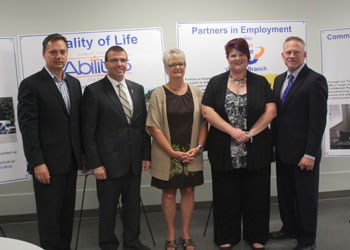The Saskatchewan Abilities Council has long been dedicated to helping people of varying abilities in the communities in which they live. However, for some people, they might have serious challenging behaviors that make it difficult to help them. A new Crisis Prevention and Support Program is being implemented, with the goal of helping these people stay in the community and overcome their crisis. The program will operate throughout the south east region of the province.
The program has been three years in the making, and is being funded by Community Living Service Delivery and the Ministry of Social Services. Bob Martinook with Community Living Service Delivery, says that the program is needed to help people stay within their communities.
"The magic happens where the person lives. Saving a placement, or providing support so a person can stay in their placement is what we want to achieve. We don't want to have people leaving their communities, going to a hospital placement or to a crisis support residential program," Martinook says.
Cheryl Minke, program manager at the Saskatchewan Abilities Council, says that the initiative will be able to better support people who have challenging behaviors, and that by working on the challenging behaviors early it will prevent other agencies from having to get involved or the person from losing their place in programs.
"At times when individuals are in crisis, and the agencies that work with them and their supports aren't able to deal with them and their situations, they're sometimes placed in a mental health facility or law enforcement is called in. We're hoping that this will prevent some of those situations."
The program will see seven staff positions created, with three of the staff members hired already.
Two members will be in Weyburn, with the remainder in Yorkton being sent out to areas that have problems.
Minke says that while the new program is aimed at helping clients, it will also help with staff retention as well, as it will make them better equipped to handle the different crisis that will result, preventing burnout and employee turnover. Martinook says education is one of the keys to prevent crisis. "There is an element of crisis support that is critical here, it's the education and crisis prevention component. That's the most important element of the service that will be provided here, because it's about preventing the crisis. There's an old saying that if you don't have a crisis, you don't need a crisis support program, so we're going to try to prevent the need for other services by having education out in the community."
Similar programs have been in place elsewhere in the province, one operated by Mental Homes in Hepburn and the other operated in Prince Albert. Martinook says that the record in these other programs has been excellent.
"The rate of successful placements after having been supported by the crisis support programs has been 80 per cent, so that's a pretty good success rate in terms of supporting persons to stay in their places. We're hoping to actually prevent discharges and transitions by getting out to the residences and supporting them before crisis or in the early stages of a crisis," Martinook concludes.




